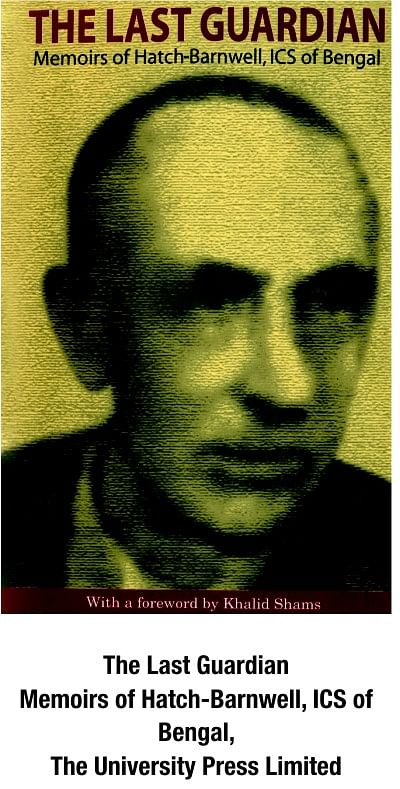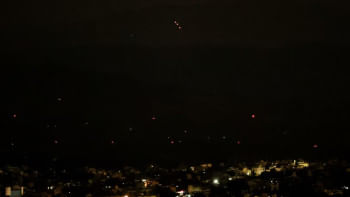Footprints on the sands of time

I love the opening line of Stephen Hatch-Barnwell's memoirs The Last Guardian for its sagacity: "It is better to trust luck than to be clever." And it is a book of memoirs, and not an autobiography. His purely personal life is dismissed in a total of three or so sheets (that, too, is a generous estimate) out of a voluminous book of 384 total pages. The rest is devoted to his professional career as a member of the exalted Indian Civil service (ICS) during the waning years of the British raj. He ended this chapter after reaching the pinnacle of the service as a member of the Civil Service of Pakistan (CSP), the successor service in the new country of Pakistan. In fact, he ended his career in East Pakistan (he had worked all his civil service life in undivided Bengal of British India and the eastern province of Pakistan) in 1966 before retiring to end his days in the country of his birth --- England. The unusual aspect of his life and career was that this was a quintessential Englishman who voluntarily opted to stay on in the land where he began his professional career even after the sun of the raj that had made his job possible had finally set in its crown jewel. Even his name, Stephen Hatch-Barnwell, smacks of the archetypal Englishman, somehow even evoking the image of an empire-builder. He has left behind one of the most delightful books that I have read over the last ten years or so.
Hatch-Barnwell (H-B, as he refers to himself in the book) is funny, self-deprecating, a good storyteller while recounting events, strongly opinionated and, on the evidence of his memoirs, a conscientious and forthright officer who embodied the esprit de corps of his elite service to a fault. He also upheld with strong conviction some old-fashioned values like spare the rod, spoil the child, resentment at the modern penchant for taking into consideration the feelings of criminals more than that of the victims, and such. Overriding all his qualities as a writer, for me as an aficionado, is the pervasive sense of humour he brings to his otherwise very serious writing. Especially as that humour is presented in the uniquely British style of understatement. Mind you, the general tone of the book is serious, informative and, at times, intense. He begins in a relatively light-hearted manner, and then progresses in an earnest mode for the rest of his journey to the epilogue, but unfailingly manages to come up with the odd delicious bit of badinage interspersed within the serious stuff.
Let me begin by presenting a few choice examples of his funny bone, especially as they were self-deprecating as well as keen observations of others' foibles. Because he "got home by a short head" in the ICS examination, and was "the last man in for my year", he considered himself among the goats (or also-rans) rather than among the sheep (or the top order), but was happy that his goat position got him posted to the place he would have preferred to be in: Bengal. "As last man in, I was more lucky, as it turned out, than surprised to find myself posted to Bengal." During training as a probationer at Oxford University, Edward Thompson, the novelist, who taught Bengali, impressed him the most. But his impression in hindsight was that "his Bengali, though amply sufficient to teach us beginners, was not as profound as his knowledge of the Bengali people." Then, recounting a particularly ridiculous bit of political and bureaucratic bungling in the immediate aftermath of the Great Bengal Famine of 1943, he thus summed up the outcome: "In the end we had to pay labour to throw the debris into the river where the fish doubtless got a good meal of mixed pulse and weevils free of charge." By the way, you will get a discerning account of the famine and his perspectives on it as an official and an observer in the self-explanatory titled chapter, "Great Bengal Famine and Politics of Food". Two of his comments warrant relating: "Basically, the Bengal famine of 1943 was at least as much an economic famine as an agricultural one." And, "...a considerable part of it was due to politically motivated cornering of a very short market, in the very last days before the new crop came in and in the days immediately thereafter."
H-B is a shrewd judge of human character and he is at his best in recounting the idiosyncrasies and foibles (including those of himself) that eloquently illustrate that delightful adage of mad dogs and Englishmen. He talks of the legendary district officers of the raj. One ICS officer, a man of considerable private means, was posted to Murshidabad, did not want promotion because it would entail being transferred somewhere else from his beloved district, and threatened to resign from the service if he was! Consequently, he remained there and was instrumental in completely upstaging Mahatma Gandhi at his own ploy. To propagate his civil disobedience campaign, Gandhi proceeded to Murshidabad, but before he could arrive, the district officer decided that he would lead a procession and hold a public meeting at the same time as the Mahatma. Accordingly, "at the appointed time, clad in a loincloth and accompanied by a goat, the District Magistrate Sahib led his procession through the town and held his meeting. Poor Gandhi was totally outshone by Mr. A's vast following and attracted none but his own already dedicated followers." Jolly good show and all that, old chap!
H-B's explanation for the fair abundance of legendary "characters" in the service before he joined it and the disappearance of those "whose eccentricities were quite...outstanding" during his tenure is as delicious as it is perceptive: "Probably the proliferation of telephones and motor cars had to some extent moderated the isolation which served as a forcing house for the seeds of any queer traits in the mental make-up of those posted to outstations." His reference to Mr. A above is an acknowledged stratagem of keeping the names of most individuals anonymous because of their foibles, but he also names names, political organizations and places. "I never liked Calcutta for more than a flying visit." The government of East Pakistan in 1955 "was riddled with corruption" and "probably contributed largely to the ease with which the military coup took place three years later." One of the architects and chief beneficiary of that coup, Ayub Khan, "was not a very good judge of men and was a bit apt to handle them as if they were chessmen." H.S. Suhrawardy he assessed this way: "As an administrator he was absolutely first class --- but as a politician less so. This was unfortunate, as with his tradition of western culture he was a firm believer in the institutions of parliamentary democracy, without realizing its practical limitations."
H-B expresses some strong reservations against both the judiciary in general, and the United States and, particularly, its aid policy. He talks about "...the art of dealing with impunity with the vagaries of the judiciary. The latter conceived it as their mission to "teach the executive a lesson" on the awe in which their "Lordships" should be held by hauling executives up on charges of contempt of court, whenever the slightest excuse of doing so could be found." And, "the higher strata of the judiciary either lived in a world of unreality or had different ideas on the administration of justice from mine." He barely concealed his contempt for the American way of doing things. "The Americans seemed to think (and I fear still do) that the "American way of life" is good enough for any people. They have evidently not read their Jean Jacques Rousseau." And, "he (Ayub Khan) need not have fallen so completely into their (the Americans) incompetent and as it ultimately proved, unreliable hands." H-B has other astute gems to offer: "...the advance of democracy had made politics a profitable industry and the achievement of cheap popularity at colossal expense to the economy was considered justifiable." And, "Politics can earn money directly and professional politicians seldom die poor."
H-B's observations on the land tenure system in Bengal, Calcutta riots and the partition of Bengal, tackling food crisis, agricultural development, Chittagong Hill Tracts and Kaptai resettlement, both from historical and personal perspectives, are illuminating and instructive. His reflections on the Bengali character are no less incisive: "For some reason the villains and clowns in works of fiction about India are usually Bengalis. This is a total misrepresentation." So, who are they? "They are highly emotional and also given to forming passionate likes and dislikes. For them the world is full of heroes and villains. They will follow their heroes blindly.... Unfortunately, they do not always choose their heroes for logical reasons and are apt to attach at least as much importance to personalities as to principles.... They are extremely idealistic.... They have a wry sense of humour and a strong sense of the ridiculous." Not too wide off the mark now, is he? There is enough in the book to keep the reader engrossed. Particularly as it is laced with delightful doses of sardonic humour. The Last Guardian: Memoirs of Hatch-Barnwell will take you back to the days when problems were complex, but life was easygoing, romance was in the air, winters were crisp and/or chilly in Bengal for close to four months at a stretch, and the bureaucrats were truly ruling servants.

 For all latest news, follow The Daily Star's Google News channel.
For all latest news, follow The Daily Star's Google News channel. 



Comments